Friedrich von Diergardt
Friedrich Freiherr von Diergardt (born March 25, 1795 in Moers , † May 3, 1869 in Morsbroich ) was a Rhenish industrialist and silk manufacturer.
biography
Friedrich Diergardt comes from a Protestant pastor's family. His father Johann Heinrich Diergardt was consistorial president .
Entrepreneurial activity
Diergardt and Theodor Kaentzeler established a velvet and velvet ribbon factory in St. Tönis in 1813 , which was relocated to Viersen in 1816 . After the business partner's death, Diergardt runs the business under his name.
The company was very important for the Rhenish Prussian industry . House weavers worked for Diergardt's trading house and factory in more than 40 localities in the administrative districts of Düsseldorf and Aachen . Since the 1940s, Viersen has employed more than 3,000 house weavers, knitters and appreteurs . The brands soon competed successfully with the French and English and often ousted them from the market in world trade .
Through his influence, Diergardt promoted the expansion of the railway network , participated in many industrial enterprises and was one of the leading industrialists in the development of the coal fields on the Lower Rhine .
Political functions
He acted as a member of the Rhenish knighthood on the provincial parliaments and in 1847 became a member of the first united Prussian state parliament and the Prussian House of Representatives until 1860. In 1860 he was raised to the baron status and appointed as a lifelong member of the manor house . In 1857 he acquired Morsbroich Castle in what is now Leverkusen as a befitting residence.
His grave is in the cemetery of the Evangelical Kreuzkirche in Viersen.
Diergardt as a social politician
Diergardt tried to keep his workers busy even in times of weak sales. As early as 1816 he founded a voluntary sick drawer to provide social security for the working class . He personally campaigned for the king to improve working conditions, took the initiative to build hospitals in Viersen, Moers and Brüggen, founded the Elisabeth Foundation for teaching the blind in Düren and finally the Diergardt Family Foundation for needy factory workers.
Honors and prizes

Diergardt became an honorary citizen of Moers on March 25, 1859 . The Zeche Friedrich Heinrich and Zeche Diergardt were named after him and his son Friedrich Heinrich von Diergardt . Various roads in the region and a school now bear his name. He has received numerous awards and prizes, including a.
- 1832: Prussian Red Eagle Order
- 1842: Diergardt is appointed Royal Secret Commerce Councilor
- 1851: First prize at the Great London World's Fair with an invitation to Buckingham Palace
- 1853: Large gold medal for services to the trade in Prussia
- 1854: Knight's Cross of the Order of Merit of St. Michael
- 1855: First prize and gold medal at the Great Paris World Exhibition
Designations
The Diergardtstrasse in Moers, the Diergardtschule and the Diergardtplatz in Viersen, the Von-Diergardt-Str. Are named after Diergardt. in Cologne and Leverkusen, the Von-Diergardt-See in Cologne on the city limits of Leverkusen (this lake is also called Dünnwalder See), as well as the Diergardt Forest in the Maas-Schwalm-Nette nature park .
literature
- Kurt Apelt: Diergardt, Friedrich Freiherr von. In: New German Biography (NDB). Volume 3, Duncker & Humblot, Berlin 1957, ISBN 3-428-00184-2 , p. 655 ( digitized version ).
- Wilhelm Crecelius: Diergardt, Friedrich Freiherr v. In: Allgemeine Deutsche Biographie (ADB). Volume 5, Duncker & Humblot, Leipzig 1877, p. 140.
- Walter Tillmann: silk, velvet and social issues. Friedrich Freiherr von Diergardt (1795-1869). A trailblazer for economic development in the Rhineland. Viersen 2000. ISBN 3-9805339-3-X .
- Gothaisches genealogical pocket book of the baronial houses for the year 1864. Fourteenth year, p. 139 f.
Web links
Individual evidence
- ↑ www.viersen.de
- ↑ akh-viersen.de ( Memento of the original from July 16, 2009 in the Internet Archive ) Info: The archive link was inserted automatically and has not yet been checked. Please check the original and archive link according to the instructions and then remove this notice.
- ↑ www.bethanien-moers.de
- ↑ Koeln.de: Von-Diergardt-Str.
- ↑ Leverkusen.com: Von-Diergardt-Str.
- ↑ Maas-Schwalm-Nette Nature Park ( Memento of the original from September 15, 2010 in the Internet Archive ) Info: The archive link was inserted automatically and has not yet been checked. Please check the original and archive link according to the instructions and then remove this notice.
| personal data | |
|---|---|
| SURNAME | Diergardt, Friedrich von |
| ALTERNATIVE NAMES | Diergardt, Friedrich Freiherr von |
| BRIEF DESCRIPTION | German industrialist |
| DATE OF BIRTH | March 25, 1795 |
| PLACE OF BIRTH | Moers |
| DATE OF DEATH | May 3, 1869 |
| Place of death | Morsbroich |
